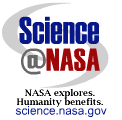 |
|
 |
|
| Subject | December Articles Date & Title |
|---|---|
| Deep Space 1 | December 20: |
| Space Shuttle | December 18: |
| Looking Up | December 13: |
| Astronauts | December 12: |
| Looking Up | December 09: |
| Earth Science | December 06: |
| Fundamental Physics | December 04: |
| International Space Station | December 02: |
| Subject | November Articles Date & Title |
|---|---|
| Life Science | November 22: |
| Black Holes | November 20: |
| International Space Station | November 18: |
| Looking Up | November 16: |
| Earth Science | November 15: |
| Looking Up | November 14: |
| Jupiter | November 08: |
| Space Shuttle | November 06: |
| Earth Science | November 01: |
| Subject | October Articles Date & Title |
|---|---|
| Asteroids | October 31: |
| Life Science | October 30: |
| Looking Up | October 24: |
| Living in Space | October 21: |
| Astrobiology | October 18: |
| International Space Station | October 16: |
| Earth Science | October 11: |
| Looking Up | October 09: |
| Planetary Astronomy | October 07: |
| Subject | September Articles Date & Title |
|---|---|
| The Cutting Edge | September 30: |
| Space Shuttle | September 26: |
| Space Weather | September 23: |
| Looking Up | September 20: |
| Chandra X-ray Observatory | September 19: |
| The Cutting Edge | September 16: |
| The Cutting Edge | September 13: |
| The Cutting Edge | September 09: |
| Earth Science | September 05: |
| The Cutting Edge | September 03: |
| Subject | August Articles Date & Title |
|---|---|
| Looking Up | August 28: |
| Fundamental Physics | August 23: |
| Fundamental Physics | August 21: |
| The Moon | August 13: |
| Mars Exploration | August 09: |
| Looking Up | August 07: |
| Subject | July Articles Date & Title |
|---|---|
| Looking Up | July 30: |
| Asteroids | July 26: |
| Looking Up | July 24: |
| Looking Up | July 19: |
| Fundamental Biology | July 16: |
| Materials Science | July 11: |
| Space Weather | July 08: |
| Astronomy | July 02: |
| Subject | June Articles Date & Title |
|---|---|
| Looking Up | June 24: |
| Looking Up | June 21: |
| Fundamental Biology | June 19: |
| New Planets | June 13: |
| International Space Station | June 12: |
| International Space Station | June 11: |
| Fundamental Physics | June 07: |
| Looking Up | June 03: |
| Subject | May Articles Date & Title |
|---|---|
| Earth Science | May 29: |
| Mars Exploration | May 28: |
| Looking Up | May 24: |
| International Space Station | May 17: |
| Fundamental Biology | May 15: |
| Looking Up | May 10: |
| Looking Up | May 06: |
| Climate Research | May 02: |
| Subject | April Articles Date & Title |
|---|---|
| Looking Up | April 30: |
| Space Weather | April 25: |
| Looking Up | April 24: |
| Earth Science | April 22: |
| Cosmology | April 19: |
| Earth Science | April 17: |
| Looking Up | April 12: |
| Earth Science | April 10: |
| Physics | April 08: |
| Asteroid Eros | April 05: |
| Materials Science | April 03: |
| Subject | March Articles Date & Title |
|---|---|
| Microgravity | March 29: |
| Physics | March 27: |
| Astronauts | March 25: |
| Earth Science | March 22: |
| Materials Science | March 20: |
| Astronauts | March 18: |
| Earth Science | March 14: |
| Mars Exploration | March 12: |
| Chandra X-ray Observatory | March 07: |
| Earth Science | March 05: |
| Subject | February Articles Date & Title |
|---|---|
| Earth Science | February 28: |
| Looking Up | February 26: |
| Black Holes | February 21: |
| Looking Up | February 19: |
| NASA Technology | February 14: |
| Planetary Astronomy | February 12: |
| Cosmology | February 08: |
| Space Weather | February 06: |
| NASA Technology | February 01: |
| Subject | January Articles Date & Title |
|---|---|
| Astrobiology | January 28: |
| Microgravity Research | January 23: |
| Space Weather | January 18: |
| The Cutting Edge | January 15: |
| Earth Science | January 15: |
| Astrobiology | January 10: |
| Solar Power | January 08: |
| NASA Technology | January 03: |